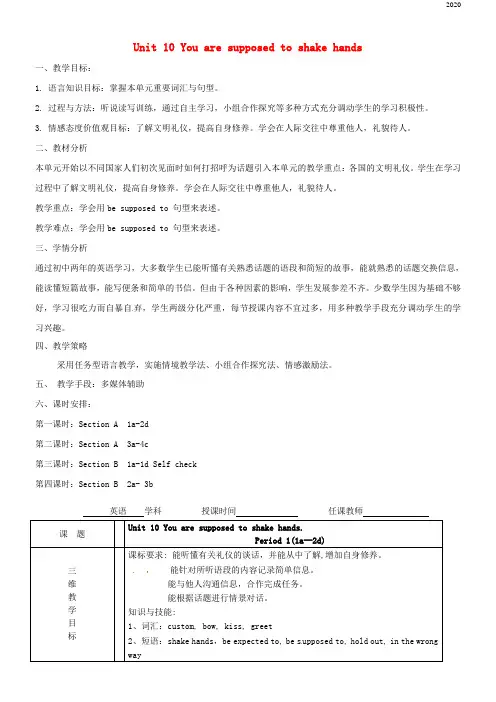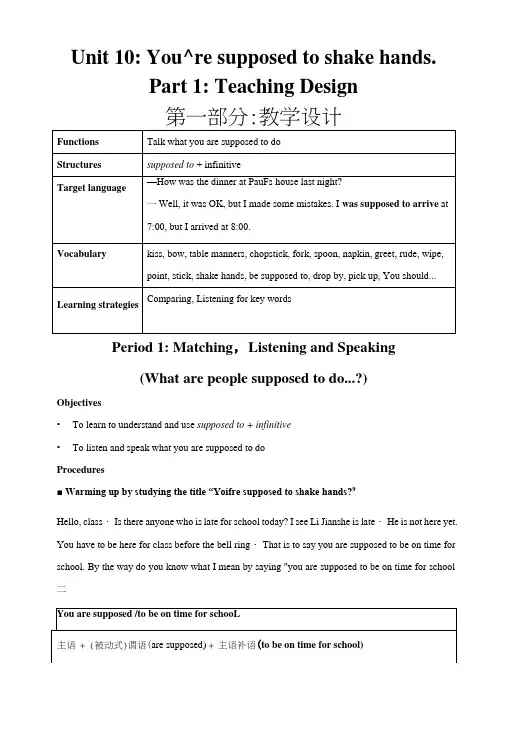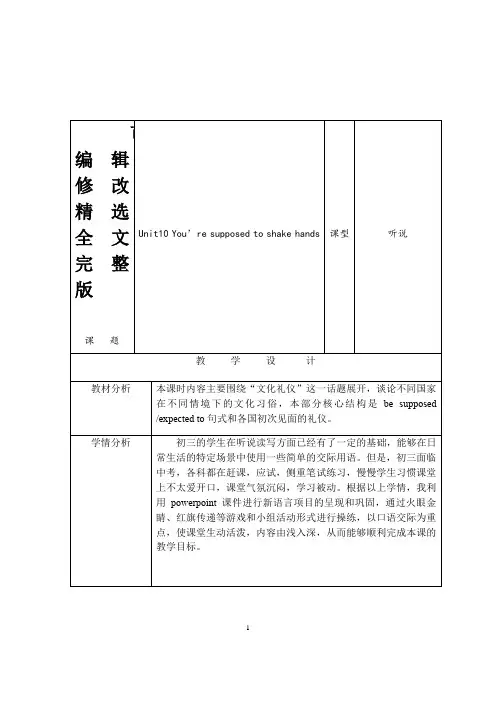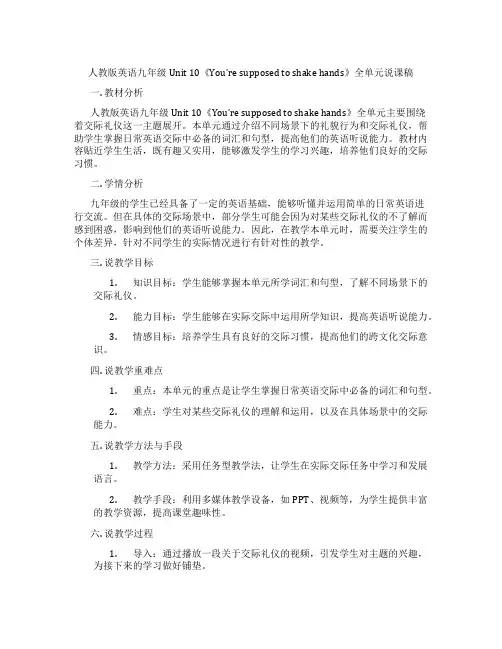Unit10 You’re supposed to shake hands教案20
- 格式:docx
- 大小:16.62 KB
- 文档页数:3


Unit 10 You are supposed to shake hands一、教学目标:1. 语言知识目标:掌握本单元重要词汇与句型。
2. 过程与方法:听说读写训练,通过自主学习,小组合作探究等多种方式充分调动学生的学习积极性。
3. 情感态度价值观目标:了解文明礼仪,提高自身修养。
学会在人际交往中尊重他人,礼貌待人。
二、教材分析本单元开始以不同国家人们初次见面时如何打招呼为话题引入本单元的教学重点:各国的文明礼仪。
学生在学习过程中了解文明礼仪,提高自身修养。
学会在人际交往中尊重他人,礼貌待人。
教学重点:学会用be supposed to 句型来表述。
教学难点:学会用be supposed to 句型来表述。
三、学情分析通过初中两年的英语学习,大多数学生已能听懂有关熟悉话题的语段和简短的故事,能就熟悉的话题交换信息,能读懂短篇故事,能写便条和简单的书信。
但由于各种因素的影响,学生发展参差不齐。
少数学生因为基础不够好,学习很吃力而自暴自弃,学生两级分化严重,每节授课内容不宜过多,用多种教学手段充分调动学生的学习兴趣。
四、教学策略采用任务型语言教学,实施情境教学法、小组合作探究法、情感激励法。
五、教学手段:多媒体辅助六、课时安排:第一课时:Section A 1a-2d第二课时:Section A 3a-4c第三课时:Section B 1a-1d Self check第四课时:Section B 2a- 3b英语学科授课时间任课教师课题Unit 10 You are supposed to shake hands.Period 1(1a--2d)三维教学目标课标要求: 能听懂有关礼仪的谈话,并能从中了解,增加自身修养。
能针对所听语段的内容记录简单信息。
能与他人沟通信息,合作完成任务。
能根据话题进行情景对话。
知识与技能:1、词汇:custom, bow, kiss, greet2、短语:shake hands,be expected to, be s upposed to, hold out, in the wrong way3、句型:You are supposed to shake hands.As soon as I held out my hand, he bowed.方法与过程:学生带着任务自主学习,合作探究,教师引导,学生总结展示知识点,记笔记。

Unit 10 You are supposed to shake hands.Section B 2a-2d任教学科:英语任课教师:李媛授课班级:初2017 级4班一、教学内容及目标分析。
本单元核心话题是不同国家的文化习俗。
SA重点了解各国礼仪方面的差异、学习用be supposed/expected to句式。
SB在SA的基础上对礼仪习俗有所拓展,聚焦不同国家的餐桌礼仪。
进一步巩固目标语言。
本课时是本单元的阅读板块。
本课的阅读策略是通过summarize和take notes 来review 文本,形成长久记忆。
1.知识目标:1)能熟练用目标语言来表达餐桌礼仪习俗。
…be supposed/expected to do…; It’s impolite/rude to ……shouldn’t…2)根据上下文能理解词义:go out of one’s way to do,feel comfortable doing, behave, basic2.能力目标。
1)能理清文章的脉络结构。
用自己的语言归纳main idea并找出supporting details.2)能理解并实践运用阅读策略帮助自己形成长久记忆。
3.情感目标。
1)更多了解法国文化之餐桌礼仪文化。
放眼世界,具有国际视野。
二、教学重难点。
重点:带领学生经过多次阅读,层层递进,归纳大意,深入文本细节!难点:学生在假设的就餐情景中能自如地用目标语言表达French table manners!二、教学过程:Post-reading Role play Get the students to performin groups of four.Use target languageto express tablemanners in FranceProvide Ss morechances to usetarget languagePost-reading Giving a speechFive Students worktogether to give aspeech about moretable manners inFrance.Help Ss learn moreFrench cultureabout tablemanners.Reading aloud Get the students to readaloud.Practice reading. Pay attention totheir pronunciationand intonation; Getmore familiar withthe passage.Assignment Offer Ss different projects according to their levels.板书设计Unit 10 You are supposed to shake hands.Section B 2a-2dgo out of one’s way to dofeel comfortable doingbehave v. --- behavior n.basic adj.Handout教学反思:。

Unit 10 You are supposed to shake hands.Section A(1a-2d)教案一、教学目标1.知识目标:掌握本单元的重点词汇及相关短语,并能灵活运用;能够正确掌握并运用Should for advice,If clauses,Passive voice等,重点掌握be supposed to do的用法。
2.能力目标:能够掌握不同国家的礼仪和风俗。
3.情感目标:Talk about customs and what you are supposed to do.二、教学内容nguage points and focuskiss ,greet,value,knock,shake hands,on time1. What are you supposed to do when you meet someone for the first time?2.—Am I supposed to wear jeans?—No,you are expected to wear a suit and tie.三、重点难点1.To improve the reading skills.2.To learn some important phrases.四、教学准备multimedia, computer, blackboard五、教学过程Step 1 Greeting and lead-inTeacher: Do you like reading books? Which classic have you read? What’s it about? Why do you like it? Now please introduce one of y our favorite classics to your partners in your group.Step 2 Presentation【完成教材1a-1c的任务】1.学生朗读1a中的书名,教师纠正错误,然后将你知道的书名标注出来。

Unit 10 You’re supposed to shake hands.The First PeriodSection A(1a-2d)Ⅰ.Teaching aims1.Knowledge aims:(1)Key words:custom,bow,kiss,greet(2)Key phrases:be supposed to do,shake hands,be expected to do,hold out,to one’s surprise,assoon as,on both sides of(3)Important sentences:①—What are you supposed to do when you meet someone for the first time?—You’re supposed to shake hands.②I held out my hand and to my surprise,she kissed me on both sides of my face.2.Ability aims:Learn to talk about good manners when we meet in different countries.3.Emotion aims:To be interested in different cultures.Ⅱ.Important points:Learn to express some sentences using“be supposed to do〞.Ⅲ.Difficult points:Grasp the usage of “be supposed to do〞.Ⅳ.Teaching processStep 1 Warming upShow students some pictures about “shake hands〞, “bow〞or “kiss〞.Answer some questions. T:In Brazil,what are you supposed to do when you meet someone for the first time?S:You’re supposed to shake hands.Teacher can ask five students about different countries,such as the United States,Japan,Mexico or Korea.Step 2 Listening1b Listen and check your answer in 1a.2a Maria is an exchange night she had dinner at an American friend’s and check (√) the mistakes Maria made.2b Listen again.Fill in the blanks.Step 2 Pairwork1c Make conversations using the information in 1a.Role-play the conversation.2c Make conversations using the information in 2a and 2b.Role-play the conversation between Maria and Dan.Dan:How was the dinner at Paul’s house last night?Maria:Well,it was OK,but I made some was supposed to arrive at 7:00,but...Step 4 Read and act2d Ask students to read the conversation in 2d by to the tape and repeat after it. Work in pairs and act it out.Language points1.In your country,what are you supposed to do when you meet someone for the first time?在你们国家,当你初次与某人见面时你应该做什么?〔教材第73页〕be supposed to 意为“应该〞,后接动词原形,相当于should 或ought to,用来表示劝告、建议、义务、责任等。

Unit 10: You^re supposed to shake hands.Part 1: Teaching Design第一部分:教学设计Period 1: Matching,Listening and Speaking(What are people supposed to do...?)Objectives•To learn to understand and use supposed to + infinitive•To listen and speak what you are supposed to doProcedures■ Warming up by studying the title “Yoifre supposed to shake hands?9Hello, class・ Is there anyone who is late for school today? I see Li Jianshe is late・ He is not here yet. You have to be here for class before the bell ring・ That is to say you are supposed to be on time for school. By the way do you know what I mean by saying "you are supposed to be on time for school 二be supposed to...其中to是动词不定式符号,不是介词,其后要跟动词原形。
当be supposed to...的主语是“人”时,意为“应该……”;“被期望……”,它可以用來表示劝告、建议、义务、责任等,相当于情态动词should。
如:Everyone is supposed to wear a seat-belt in the car.每个人在汽车里都应该系安全带。


1
2
3
4
Step10 Homework (2分钟)布置作业。
1. Make 5 sentences with
“be supposed to do…”
2. Find some information
about table manners in
different countries.
通过此活动巩固目标
语言。
板书设计
Unit10 You’re supposed to shake hands.
Period1 Section A 1a—2c
A:In … what are the people supposed to do when they meet for the first time?
B:They are supposed to shake hands/bow/ kiss…
课前预测
本节课主要语言项目学习一些见面礼仪,谈论不同国家在不同情境下的文化习俗,以“展示各国国旗”方式导入新课,形式新颖,吸引学生兴趣,预测能更好地导入新课。
通过展现PPT图片和“火眼金睛”和“传递红旗”2两个游戏活动,进行新语言项目单词升华到句子的呈现和巩固。
以小组活动为主,男女PK等形式进行鼓励性评价,随机抽号方式提问。
新颖,刺激,更能吸引学生的眼球,激发学生学习欲望。
预测课堂气氛较好,学生参与活动性高,从而使学生更好地掌握新单词和新句型。
最后小组以“妙手生辉”创造性形式总结本节课学习内容,发挥学生综合能力,这也是本节课高潮部分。
以多样化手段,让学生在快乐的活动体验中,循序渐进地突破重、难点,学生在用中学,学中用。
预测可以达到良好教学效果。
5。

Unit 10 You’re supposed to shake hands(第2课时)说课稿一. 教材分析《Unit 10 You’re supposed to shake hands(第2课时)》是人教版初中英语八年级上册的一篇文章。
本课时主要讲述在不同的场合如何进行正确的礼仪行为。
文章通过介绍西方和中国的礼仪差异,让学生了解和掌握正确的礼仪知识,提高跨文化交际能力。
本节课的主要内容是学习动词短语和交际用语,如“shake hands”,“bow”,“take pictures”,“exchange business cards”等。
二. 学情分析八年级的学生已经具备了一定的英语基础,对于日常的交际用语和动词短语有一定的了解。
但学生在跨文化交际方面还较为薄弱,对于西方和中国的礼仪差异认识不够。
因此,在教学过程中,教师需要帮助学生更好地理解文章内容,引导学生运用所学知识进行实际操作。
三. 说教学目标1.知识目标:–能够听懂、说出一系列动词短语,如“shake hands”,“bow”,“take pictures”,“exchange business cards”等。
–能够理解文章内容,掌握西方和中国的礼仪差异。
2.能力目标:–能够用英语进行简单的跨文化交际。
–能够运用所学知识进行角色扮演和实际操作。
3.情感目标:–培养学生尊重不同文化的意识,提高跨文化交际能力。
–培养学生积极参与课堂活动,提高合作意识。
四. 说教学重难点•掌握动词短语“shake hands”,“bow”,“take pictures”,“exchange business cards”等。
•理解文章内容,了解西方和中国的礼仪差异。
•能够在实际情境中正确运用所学知识进行跨文化交际。
•能够用英语进行角色扮演和实际操作。
五. 说教学方法与手段1.教学方法:–任务型教学法:通过完成各种任务,让学生在实践中学习和运用语言。
–情境教学法:创设真实的交际情境,让学生在特定的情境中学习语言。

人教版英语九年级Unit 10《You’re supposed to shake hands》全单元说课稿一. 教材分析人教版英语九年级Unit 10《You’re supposed to shake hands》全单元主要围绕着交际礼仪这一主题展开。
本单元通过介绍不同场景下的礼貌行为和交际礼仪,帮助学生掌握日常英语交际中必备的词汇和句型,提高他们的英语听说能力。
教材内容贴近学生生活,既有趣又实用,能够激发学生的学习兴趣,培养他们良好的交际习惯。
二. 学情分析九年级的学生已经具备了一定的英语基础,能够听懂并运用简单的日常英语进行交流。
但在具体的交际场景中,部分学生可能会因为对某些交际礼仪的不了解而感到困惑,影响到他们的英语听说能力。
因此,在教学本单元时,需要关注学生的个体差异,针对不同学生的实际情况进行有针对性的教学。
三. 说教学目标1.知识目标:学生能够掌握本单元所学词汇和句型,了解不同场景下的交际礼仪。
2.能力目标:学生能够在实际交际中运用所学知识,提高英语听说能力。
3.情感目标:培养学生具有良好的交际习惯,提高他们的跨文化交际意识。
四. 说教学重难点1.重点:本单元的重点是让学生掌握日常英语交际中必备的词汇和句型。
2.难点:学生对某些交际礼仪的理解和运用,以及在具体场景中的交际能力。
五. 说教学方法与手段1.教学方法:采用任务型教学法,让学生在实际交际任务中学习和发展语言。
2.教学手段:利用多媒体教学设备,如PPT、视频等,为学生提供丰富的教学资源,提高课堂趣味性。
六. 说教学过程1.导入:通过播放一段关于交际礼仪的视频,引发学生对主题的兴趣,为接下来的学习做好铺垫。
2.新课呈现:教师带领学生学习本单元的词汇和句型,并通过真实场景的展示,让学生了解不同场景下的交际礼仪。
3.课堂互动:学生分组进行角色扮演,运用所学知识进行实际交际,教师巡回指导,纠正发音和表达错误。
4.巩固练习:教师设计一系列练习题,让学生在纸上完成,检测他们对本单元知识的掌握程度。

Unit 10 You’re supposed to shake hands. 教学设计一. 教学目标知识目标:Master the words and phrases: behave, except, suggestion, elbow, gradually, go out of one’s way, make … feel at home, elbow, graduallySentences:1.They go out of their way to make me feel at home.2. I find it difficult to remember everything, but I’m gradually getting used to it.3. She is comfortable speaking French now.4. It doesn’t worry her as it used to.技能目标: 能够运用目标语言谈论不同国家的餐桌礼仪。
情感态度: 学会比较不同文化的差异,风俗和礼仪,增强学生的人际交往能力。
二. 教学重难点重点单词:behave, except, suggestion, elbow, gradually, go out of one’s way, make … feel at home, elbow, gradually重点句型:1.They go out of their way to make me feel at home.2. I find it difficult to remember everything, bu t I’m gradually getting used to it.3. She is comfortable speaking French now.4. It doesn’t worry her as it used to.三. 教学过程Ⅰ.Lead-in播放一个关于吃饭禁忌的视频,让学生观察外国人就餐的好习惯与禁忌,然后老师问,从这个小视频中大家能学习到什么?设置悬念,引导学生阅读。
Unit 10You're supposed to shake hands.课时分解第一课时Section A(1a~2d)在玛丽亚的国家,当你被邀请7点钟到,你应当在早点退到。
自主学习案翻译下列词组。
1.握手shake__hands__ 2.应该做某事be__supposed__to__do__sth.3.伸出手hold__out__one's__hand 4.找出,查明,出现find__out5.初次for__the__first__time 6.犯错make__mistakes7.衣着不得体wear__the__wrong__clothes8.问候的方式错了greet__sb.the__wrong__way课堂导学案Step 1 准备与热身(Preparation)师生讨论:学生在学校应该做哪些事情?引出新句型。
T :Is it a good idea to come to class late?S: No.T: That's right. It's not a good idea to come late. You're not supposed to come to class late. You're supposed to …do homework every day, raise your hand before talking等做更多的练习,引出be supposed to句型。
Step 2 呈现与输入(Presentation)1. 要求学生看课本P73 1a部分的图片。
并按要求完成课本上相应的任务。
(1分钟)2. 检查答案,先要求全班一起给出答案并检查讨论。
然后要求2-3名同学根据提示内容编写对话,并把学生所编写的对话列举在黑板上。
(3分钟)参考案例Teacher:In your country, what are you supposed to do when you meet someone for the first time?Students:We are supposed to ______.①bow② kiss③ shake hands……3.要求学生听第一遍录音,并完成课本上1b的听力任务。
Unit 10 You’re supposed to shake hands.第一课时课型:听说课授课时间:年月日一、学习内容:Section A 1 (1a-2d)二、学习目标1.知识与技能:1)能听说读写重点词汇custom, bow, kiss, greet, be supposed to,2)掌握be supposed to句型的用法。
2. 过程与方法:掌握be supposed to句型的用法。
3. 情感态度价值观:学习一些见面礼仪,生活习俗和对时间的看法。
了解西方国家的风土人情和习俗。
三、学习重点:be supposed to的用法四、学习难点:中西方人们见面礼仪的差别, 培养学生跨文化交际意识。
五、教法:情景教学法、多媒体辅助教学、对话练习、结对合作。
六、学法:自主、合作、交流、展示。
第二课时课型:阅读课授课时间:年月日一、学习内容:Section A 3a-3c二、学习目标1.知识与技能:1)学习掌握下列词汇:relaxed, value, capital, noon, mad, effort, drop by, after all, get mad, make an effort 2)复习be supposed to句型。
3)如何正确的阅读课文。
2. 过程与方法:阅读短文,能按要求找到相应的信息, 提高学生们的阅读能力。
3. 情感态度价值观:1)通过“应该”与“不应该”进一步了解一些国家的礼仪和对时间的看法。
2)了解不同国家的不同的时间观念,加强对中国文化的理解。
三、学习重点:1) 掌握本部分出现的生词和词组,达到熟练运用的目标。
2) 阅读短文,获得相关的信息。
通过阅读练习,来提高阅读能力。
四、学习难点:1) 阅读短文,获得相关的信息的能力。
2) 理解并运用所学的词汇及表达方式。
五、教法:情景教学法、多媒体辅助教学、对话练习、结对合作。
第三课时课型:语法课授课时间:年月日一、学习内容:Section A 4a - 4c二、学习目标1.知识与技能:1) 学习掌握下列词汇:passport, clean…off, chalk, blackboard, northern, coast, season, knock, eastern, take off, worth, manner.2) 掌握be supposed to, be expected to, be important to的句型。
Unit 10 You’re supposed to shake hands. (Period 7)单元复习课本单元话题是“礼仪、习俗”(Customs )。
本节课是本单元的第七节课,是围绕本话题展开的复习课。
主要活动包括对单元词汇、短语、句型的复现,对考点及语法的针对性练习和知识的迁移运用,需要学生在复习的过程中巩固单元重点知识。
学完这一课,学生能够掌握:1.词汇:Unit 10的重点词汇及核心考点;2.语法:be supposed to... 的用法;3.交际功能:能够熟练运用be supposed to...以及“It is+adj.+to do sth.”结构来谈论各国风俗和餐桌礼仪。
be supposed to... 的用法以及take off 、worth 、except 等核心考点的用法。
be supposed to... 以及“It is+adj .+to do sth.”结构的用法。
课堂导入 首先,教师采用Ask and answer 的活动形式,对学生提出“What are people supposed to do when they meet for the first time?”的问题,引导学生根据横线前关键词的提示用英文表达出来,从而导入本节课的学习。
知识探究 Step 1: 话题梳理【教师活动】教师梳理本单元的话题及功能,然后组织“头脑风暴”,引导学生说出本话题内容层次及相关词汇、句型,引导学生基于前面复习的内容,整合本单元学习的重点知教学过程 教学重点 教学目标 教材分析识,思考并构建单元知识的脑图。
教师逐步呈现脑图,补充总结。
【学生活动】梳理本单元重点知识,思考并构建单元知识的脑图。
Step 2: 考点突破【教师活动】教师组织梳理必过考点,让学生通过练习练会以下核心考点,并以练习带动知识复现、复习和应用,使学生达到真正掌握知识点的目的。
(1)take off(2)worth(3)except(4)get used to(5)suggestion【学生活动】完成学习任务单中相关的课堂学习任务。
Unit10 You’re supposed to shake hands.课文重难点知识点详细讲解1.be supposed to 的用法用法一:be supposed to... 其中to是动词不定式符号,不是介词,其后要跟动词原形。
当be supposed to... 的主语是“人”时,意为“应该......;“被期望......,它可以用来表示劝告、建议、义务、责任等,相当于情态动词should。
如:Everyone is supposed to wear a seat-belt in the car. 每个人在汽车里都应该系安全带。
Teachers are supposed to treat all the students alike. 老师应该对所有的学生一视同仁。
用法二:当be supposed to... 的主语是“物”时,它表示“本应;本该”,用于表示“某事本应该发生而没有发生”。
如:The new laws are supposed to prevent crime. 这些新法令本应该起到防止犯罪的作用。
The train was supposed to arrive half an hour ago. 火车本应在半小时之前到达。
用法三: be supposed to后面接“have + 过去分词”时,表示“本应该做某事而没做”。
如:You are supposed to have handed in your homework by now. 现在你应该已经把作业交上来了。
He is supposed to have arrived an hour ago. 他应该一小时前就到了。
用法四: be supposed to... 的否定结构为be not supposed to...,它常用于口语中,意为“不被许可;不应当”。
如:She was not supposed to be angry about that. 她本不该为那件事而生气的。
You are not supposed to smoke on the bus. 你不应该在公共汽车上吸烟2.be expected to do 和 be supposed to do 区别be supposed to do是被期望或要求,应该.相对于be expected to do 主观性强一些.它相当于should的这个用法是有希望做(成)......expect在朗文的第一词条即为:预料、期待。
例:They are expected to make an announcement later on today.(预料他们今天晚些时候会宣布一项通告)再次例句中,be expected to do意为预料,表示一种可能性再如:She is expected to be a good doctor.(他有希望成为一名好医生)3.expect 用法请读下面的句子,注意expect的用法。
1. I expect a snowstorm. 我预计会有一场暴风雪。
2. The old man is expecting his daughter’s visit.这个老人盼望着他女儿的到访。
3. I expect to get a birthday present from my dad. 我期待着收到一件来自父亲的礼物。
4. Do you expect him to teach you English? 你希望他教你英语吗?5. I didn’t expect that you would get there so soon. 我没想到你会这么快就到达那里了。
及时归纳】 expect是及物动词,意为“预料,盼望”,它有以下常见用法:1. expect + n. / pron. 预计......可能发生;期待某人或某物2. expect + to do sth. 料想做某事3. expect sb. to do sth. 期望某人做某事4. expect + 从句预计 / 料想......4.relax,relaxed,relaxing的区别与不同的用法1. relax是动词,不及物或及物动词,及物时,宾语是sb ,使某人放松、使某人休息、使某人轻松。
Now I want to rest and relax. 不及物现在我得休息一下,放松放松I need a cup of tea to relax myself.及物我需要喝杯茶使自己轻松一下。
2. relaxed,形容词某人感到轻松、放松、不受拘束的。
指某人“感到”轻松。
可以这样理解,形容人如何如何。
同interested\excited\surprised\bored\tired有类似用法。
如 He is feeling relaxed.或He is relaxed The song can make me relaxed.3. relaxing形容词某事情令人轻松的,指某事某物“令人”轻松。
可以这样理解,修饰物或事。
同interesting\exciting\surprising\boring\tiring有类似用法。
The song is relaxing. 这首歌真使人轻松。
You can listen to relaxing music in the bath! (修饰music)你甚至可以边洗澡边听(令人)轻松的音乐。
5.As soon as的用法1. 一经...;立即...;一...就... as soon as表示一。
就,其中的从句通常用一般现在时表示将来时。
这个短语用的比较常用,口语和书面语都可以。
它的特点是,在句子中的位置比较灵活,而且可以用于各种时态。
例如:1、指未发生的动作,规律是:主句一般将来时,从句用一般现在时代替一般将来时如:I will tell him the news as soon as he comes back。
注:有时,为了特意表达刚刚完成某事就如何如何,需要用现在完成时。
如:I will go with you as soon as I have washed my face.2、指紧接着发生的两个短动作,主从句都用一般过去时如 He took out his English books as soon as he sat down 不过,我也见过从句和主句都用一般现在时的情况。
如:As soon as he finishes his classwork, he runs out of the class.他一做完课堂作业,就跑出了教室。
总之,记住那两种基本的情况,不把时态用得太混乱了就行了(比如后面从句里用了将来时,就绝对允许了)。
以下一些双语例句尝试自己书写1. Come here as soon as you finish the work. 工作一结束你就到这里来。
2. He jumped out of bed as soon as he was called.一听到有人叫他,他立即跳下床来。
3. Let's talk the matter over as soon as we are conveniently alone. 让我们单独在一起的时候再讨论这件事情吧。
4. As soon as Marie opened the door, the dog ran in.当玛丽一打开门,狗就跑了进来。
5. As soon as I stepped inside,my glasses misted over. 我一踏进里面,眼镜马上蒙了一层雾。
6.hold out1. 伸出;拿出:例句: They all held out their hands to welcome me. 他们全都伸出双手欢迎我。
Martha held out a cheongsam for us to look. 玛莎拿出一件中国旗袍展示给我们看。
2. 提出,提供;抱有(希望等):例句:When talking about cooperation agreement, they held out several harsh terms. 当会谈谈到合作协议时,他们提出了一些苛刻的条件。
He said he held out a good opinion of Mary as soon as he saw her. 他说他一见到玛丽就对她抱有好感。
3. 坚持,不退让;不屈服:例句: They held out against enemy for six months. 他们坚持不屈抗击敌人达六个月之久。
4. 继续运转:例句: This old machine will hold out for another 20 years.这台老机器还会再运转20年。
5. 继续生存,支撑;维持:例句: It's not easy for him to hold out to the end. 他很难坚持到底。
Such a situation held out for another half a month. 这种局面又维持了半个月。
6. 拖延,抵制,拒不同意:例句: All items had been talked over, but he held out at last. 所有的条款均已协商好,可最后他竟拒绝签约。
7. 声称:例句: He held himself out as my uncle.他自称是我的叔叔。
8. [美国口语]扣留;隐瞒(常与 of 连用):例句: Their salaries were held out for a long time. 他们的工资被扣发了很长时间。
He told her the course of the incident of which he held out some details. 他把事情的经过告诉了她,可向她隐瞒了其中的某些细节7.Value vt.1. 估价,评价[(+at)]That watch was valued at $100. 那只表估计值一百美元。
I value this necklace at $5,000. 我估计这条项链值五千美元。
2. 尊重;重视,珍视My father values honesty beyond all things. 我父亲把诚实看得比什么都重要。
8.drop by 随便来,随便来玩,随便走访,非正式访问例句: Drop by whenever you have time. 如果有空随便来Drop by whenever you feel like it. 随时即兴就来我这儿坐坐I'll drop by on my way home if I have time有空的话回家途中我会顺便来看你I have to drop by the bank to get some money 我得到银行去取一下钱She and Mary are dropping by later. 她和玛丽一会儿要来坐坐drop by和 drop in。